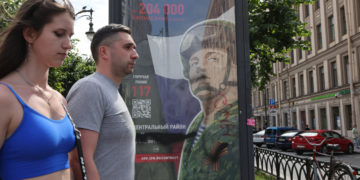The expense of Vladimir Putin‘s full-scale invasion of Ukraine, as well as his apparent plans to maintain the war, is putting Russia’s economy in danger of “burnout,” according to new analysis.
That assessment by the Institute for the Study of War (ISW) followed a decision by Russia’s Central Bank led by Elvira Nabiullina to increase its key interest rate by 2 percentage points to 21 percent—the highest level in modern Russian history.
“Russia’s economy and war effort is coming under increasing strain,” the ISW said in an update on Sunday, noting this will “pose increasingly acute challenges” to Putin’s ability to sustain the war over the long term.
Russia’s key interest rate is now 1 point more than the emergency 20 percent level after the war started in February 2022 amid the turmoil of sanctions and economic isolation by the West—and it could go higher.
Newsweek has contacted Russia’s Central Bank for comment.
“The main problem is that this will further weigh on private-sector investments, which have already started weakening, because the borrowing costs are now reportedly exceeding the profitability in many sectors,” Vasily Astrov, senior economist at the Vienna Institute for International Economic Studies, told Newsweek.
“The counterargument of Ms. Nabiullina is that this will create the window of opportunity for the businesses that invest out of profits rather than by taking credit, and that this is the way it should be,” he said.
“I am not convinced about this argument—and I am not sure that it is a very wise strategy for the central bank to fight inflation at all costs, especially since the latter has been increasingly driven by supply-side factors.”
Despite earlier predictions by the International Monetary Fund (IMF) of 3.6 percent gross domestic product (GDP) growth this year, the fund expects an abrupt slowdown in Russia next year.
This GDP level coming amid unprecedented sanctions has been helped by increased trade with so-called “friendly countries,” particularly with oil supplied by Russia’s “shadow fleet.” Growth has also been stoked by record military spending.
Huge troop losses and people fleeing the draft have caused a lack of workers, fueling salaries which have rocketed to lure soldiers to fight in Putin’s war. Meanwhile, a clampdown on foreign workers following the Moscow Crocus City Hall attack in March in which migrants from Tajikistan were implicated, has exacerbated the labor shortage.
High Salaries, High Inflation, Worker Shortages
Meanwhile, private Russian companies have had to keep up with Russian military salaries.
Sergey Chemezov, a Putin ally and CEO of the state-owned Rostec which produces much of Russia’s arms and military equipment, said most companies could go bankrupt with the high interest rate. “There is no 20 percent profitability anywhere,” he said last week. “It is simply not profitable for enterprises to use borrowed funds.”
The ISW said the costs of funding the war will increase as Moscow continues to expend manpower and equipment. “Russian resources are finite, and Putin cannot reckon with these costs indefinitely,” it said. “Russia’s economy will reach a burnout point.”
That may force the Russian president to make major decisions about how to resource the war or change its method of fighting to preserve his regime’s stability, the Washington D.C. think tank added.
Russia’s Central Bank has left the door open to raising the rate further, with independent outlet The Bell reporting it could reach 23 percent at December’s meeting, making it harder for debt-laden businesses to refinance their loans as they enter 2025.
At the same time, the Russian government is increasing spending, such as through subsidies on business loans, which is fueling inflation, which at 8.5 percent for 2024 is higher than the previously forecast 6.5 percent.
“The result is a strange phenomenon,” The Bell said. “The Central Bank, responsible for inflation, needs to raise interest rates to slow price increases. But government spending is making inflation worse.”
However, Astrov said that the current level of inflation “is not a tragedy” and that there are many examples of countries with successful economic development over longer periods with persistent inflation at similar levels.
“Suppressing it by draconian monetary policy measures will only lead to stalling private investments, thereby exacerbating in the future the very problem of supply-side bottlenecks,” he added.
The post Putin’s Economy Approaches ‘Burnout Point’ appeared first on Newsweek.


















